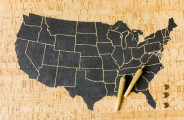
Weighing the Odds in Sports Betting
A 2025 complete guide to sports betting laws by State

If you've ever tried betting on sports while traveling, you know the frustration. Step across a state line and suddenly your favorite sportsbook doesn't work, or worse, you discover betting is completely There are occasions when we here at ReadyBetGo want to bring you interesting facts about the gambling industry When something catches our eye, we will publish it for your enjoyment.
There are occasions when we here at ReadyBetGo want to bring you interesting facts about the gambling industry When something catches our eye, we will publish it for your enjoyment. 
illegal where you're headed. Seven years after the Supreme Court killed PASPA, we're still dealing with a mess of conflicting state laws that make no sense to anyone except lawyers and regulators.
Right now, 38 states plus D.C. allow some form of sports betting, though only 29 let you bet online. Americans threw nearly $150 billion at sportsbooks in 2024, generating over $13.7 billion in revenue. That's serious money, which explains why companies like CogniPlay keep building new tools to help operators navigate this regulatory nightmare. Meanwhile, 11 states still treat sports betting like it's 1950, creating a bizarre situation where you can drive from New York (51% tax rate) to Pennsylvania (36% tax rate) and find completely different rules for the same activity.
Missouri just became the poster child for how messy these fights get, barely squeaking through legalization last November.
Missouri's $54 million betting war
Missouri voters basically flipped a coin on sports betting last November, passing Amendment 2 by the skin of their teeth—50.1% to 49.9%. We're talking about 7,486 votes deciding whether 6.2 million people get access to legal sports betting. The campaign spending was absolutely bonkers: $40 million from the pro-betting side, mostly courtesy of DraftKings and FanDuel, while opponents dropped a record $14 million trying to kill it
Here's what made Missouri interesting—the professional sports teams weren't just cheerleading from the sidelines. The Cardinals, Blues, Chiefs, and Sporting KC each ponied up around $300,000 to support legalization. Smart move, considering they'll get 6 of the state's 21 digital licenses reserved just for them.
The other 15 licenses get split between casino operators (13 spots) and independent companies (2 spots). Missouri regulators hit some speed bumps when their emergency rules got rejected in March, but they're still pushing toward a December 1, 2025 launch. That would make Missouri the 39th state with legal betting—not bad for a state that couldn't decide if it actually wanted sports betting.
Industry folks expect billions in annual betting volume once Missouri hits its stride. Like everywhere else, over 98% of those bets will happen on phones and computers rather than at physical locations. Nobody wants to drive to a casino to bet $20 on a Tuesday night game.
When states get greedy
Illinois just pulled off one of the shocking tax grabs we've seen, switching to a progressive system that hits operators for 20% to 40% based on how much money they make. Translation: DraftKings and FanDuel, who dominate the market, now pay the maximum 40% rate instead of the old 15% flat fee. That's not a tax increase—that's highway robbery.
Governor Pritzker originally wanted a 35% flat rate, but state senators decided to really stick it to the big operators. Illinois now sits behind only New York in terms of punitive tax rates. Expect other cash-strapped states to follow suit because taxing sports betting is way easier than explaining to voters why you're raising income taxes.
The feds are circling too. Representatives Paul Tonko and Senator Richard Blumenthal brought back the SAFE Bet Act in March, proposing national standards for everything from marketing to AI use in betting apps. The bill wants a national self-exclusion list and would ban proposition bets on college sports. Senator Blumenthal thinks the self-exclusion list is the most important part.
The insider trading problem
Twenty-five states ban athletes and team personnel from betting, but only four actually punish the person placing the bet. Colorado, Michigan, Virginia, and West Virginia will come after you directly if you're caught. The other 21 states just fine the sportsbook for accepting your action. Seems backwards, but that's government logic for you.
Some things are banned everywhere: political betting, Oscar predictions, high school sports, and reality TV outcomes. The consistency is refreshing compared to the chaos everywhere else.
Esports creates another headache. Nineteen states explicitly allow it, thirteen ban it, and nineteen more exist in legal limbo where nobody knows what's allowed. Age requirements vary too—some states let 18-year-olds bet on League of Legends but require you to be 21 for NFL games.
Why 11 States Still Say No
Eleven states still treat sports betting like it causes the plague: Alabama, Alaska, California, Georgia, Hawaii, Idaho, Minnesota, Oklahoma, South Carolina, Texas, and Utah. Each has its own reasons for staying stubborn.
California and Texas represent huge missed opportunities. California's tribal gambling interests and Texas's conservative legislature keep blocking progress. Alabama keeps flirting with legalization since daily fantasy is already legal there, but can't quite pull the trigger.
Georgia legislators tried multiple times in 2024 but couldn't get past the constitutional amendment requirement. Minnesota has active legislation (SB 757) that would create 11 licenses through tribal partnerships. We'll see if that goes anywhere.
Politics change fast in this business. Texas lawmakers are already floating new bills that could open the door. Money has a way of changing minds.
Betting on America's future
This state-by-state mess creates winners and losers based purely on geography. Missouri's December launch adds 6.2 million potential customers to the legal market, but the remaining holdouts ensure this guide stays relevant longer than anyone wants. Understanding these laws matters beyond just finding where to place your next bet—it's a case study in how America handles new technology, changing social attitudes, and the eternal tension between state and federal authority. The patchwork will eventually give way to something more coherent, but we're not there yet.
